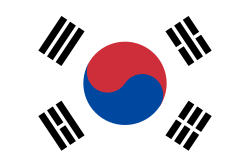| South Korea at the 2017 Asian Winter Games | |
|---|---|
 | |
| IOC code | KOR |
| NOC | Korean Olympic Committee |
| in Sapporo and Obihiro 19–26 February | |
| Competitors | 141 in 5 sports |
| Flag bearer | Jung Dong-hyun |
| Medals Ranked 2nd |
|
| Asian Winter Games appearances (overview) | |
South Korea competed in the 2017 Asian Winter Games in Sapporo and Obihiro, Japan from 19 to 26 February. [1] [2] The country's goal for the games was a top two finish, and a record medal haul with at least 15 gold medals. [3] [4]
Contents
- Hotel Controversy
- Medal summary
- Medal table
- Medalists
- Competitors
- Alpine skiing
- Biathlon
- Cross-country skiing
- Curling
- Men's tournament
- Women's tournament
- Figure skating
- Freestyle skiing
- Ice hockey
- Men's tournament 2
- Women's tournament 2
- Short track speed skating
- Ski jumping
- Snowboarding
- Speed skating
- References
- External links
South Korea competed in all five sports (eleven disciplines). [5] The team consisted of 141 athletes. [6]
On 17 February 2017, it was announced that alpine skier Jung Dong-hyun would be the country's flagbearer during the parade of nations at the opening ceremony. [7]